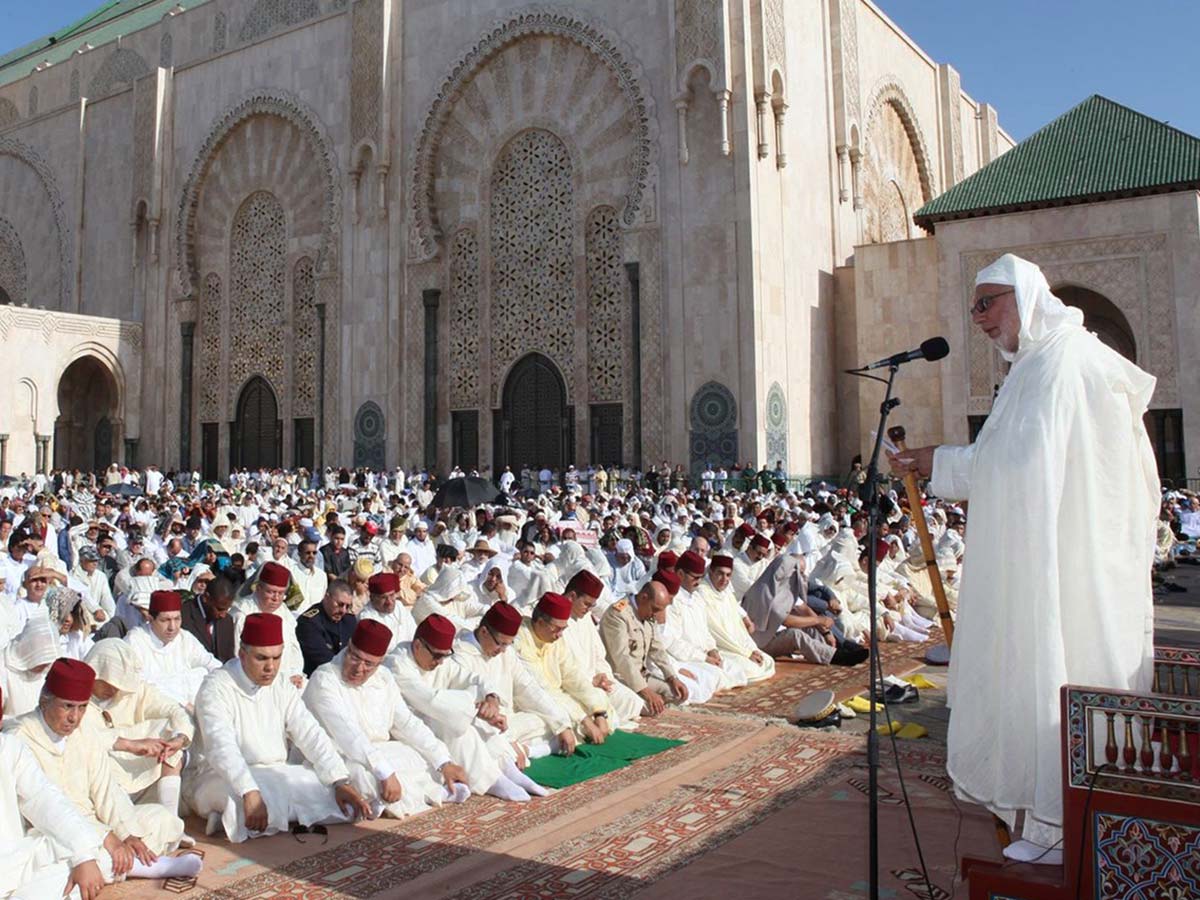As the sun sets over the vibrant city of Marrakesh, the air fills with the melodic sound of prayer calls and the tantalizing aroma of freshly prepared feasts. Lantern-lit streets come alive with the bustling energy of families gathering, children laughing, and market vendors calling out their final sales. This is Eid Al-Adha in Morocco, a time when tradition, community, and festivity blend into a mesmerizing celebration. Whether you’re wandering through the historic souks or sharing a meal with welcoming locals, experiencing Eid Al-Adha in Morocco is a cultural immersion that captivates the senses and warms the heart.
About Eid Al-Adha:
Eid Al-Adha, also known as the “Festival of Sacrifice,” is one of the most significant Islamic holidays. It commemorates Prophet Ibrahim’s unwavering faith and obedience to God, demonstrated by his willingness to sacrifice his son, Ismail. According to Islamic tradition, God intervened at the last moment, providing a ram to sacrifice instead. This event is celebrated by Muslims worldwide with prayer, acts of charity, and the ritual sacrifice of an animal, usually a sheep, goat, or cow, symbolizing the ram provided by God. The meat from the sacrifice is then distributed among family, friends, and those in need, embodying the spirit of giving and community that defines Eid Al-Adha.
Preparation for the Trip:
When planning your trip to Morocco for Eid Al-Adha, a few key preparations can enhance your experience:
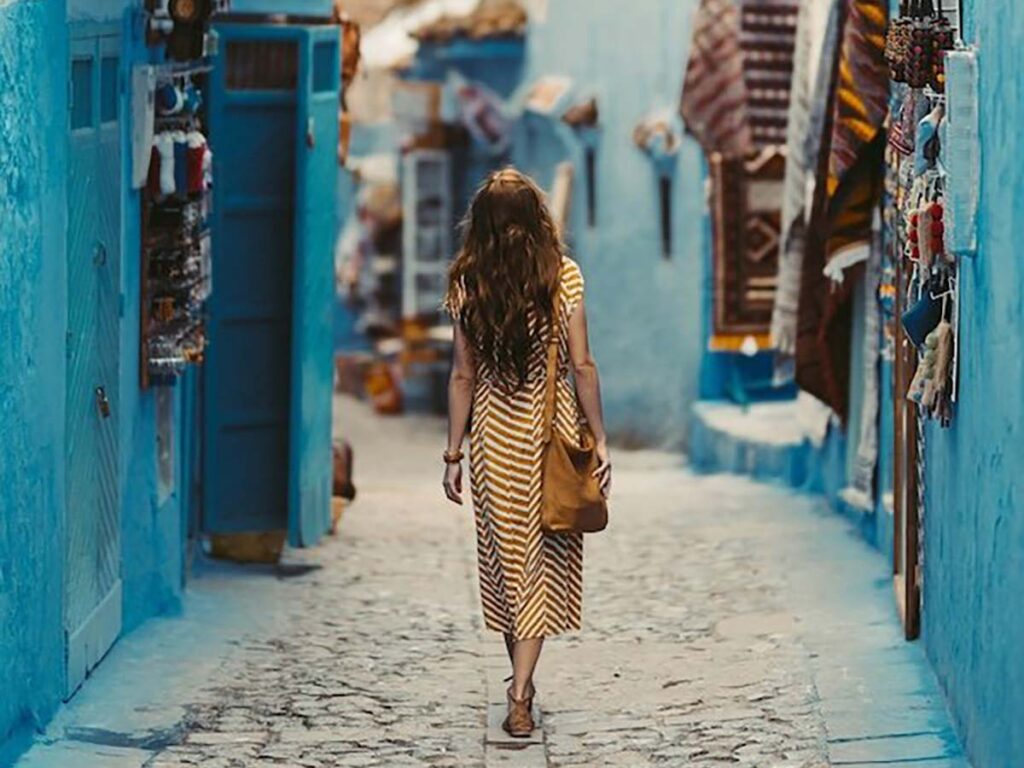
1. Pack Modest Clothing:
- Respect local customs by wearing modest attire. Opt for long sleeves, trousers, or skirts that cover your knees.
- Lightweight, breathable fabrics are ideal for Morocco’s warm climate.
2. Bring a Camera:
- Capture the vibrant celebrations and stunning landscapes. From bustling souks to serene mosques, there are countless photo opportunities.
- Ensure you have enough storage and backup batteries.
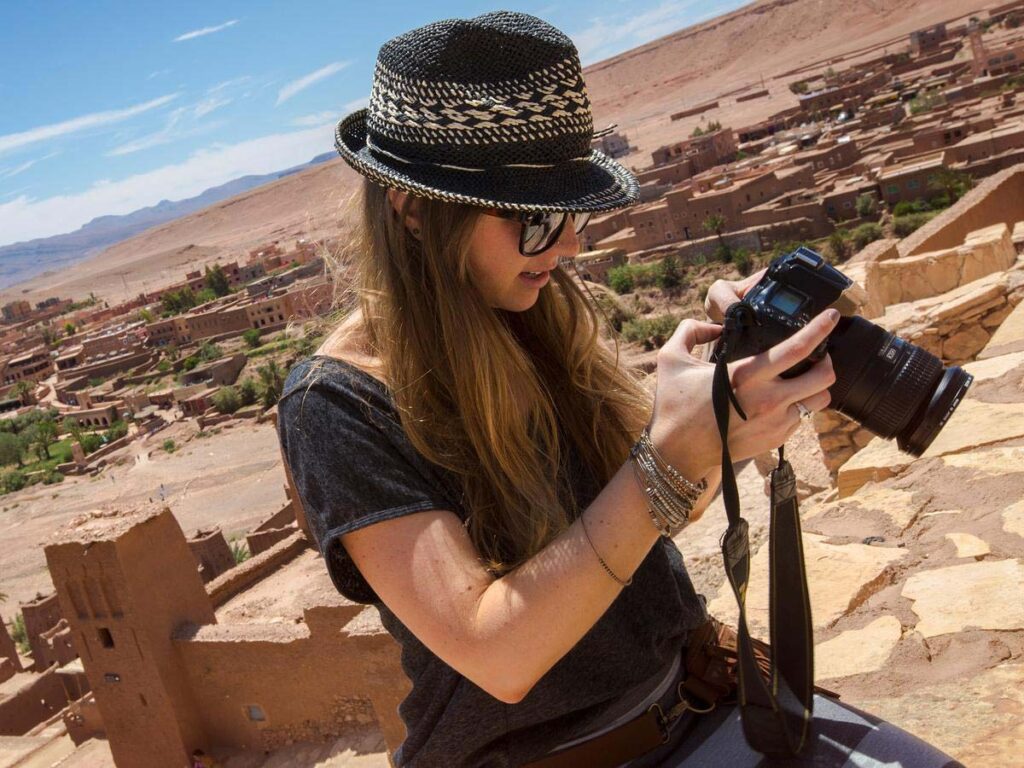
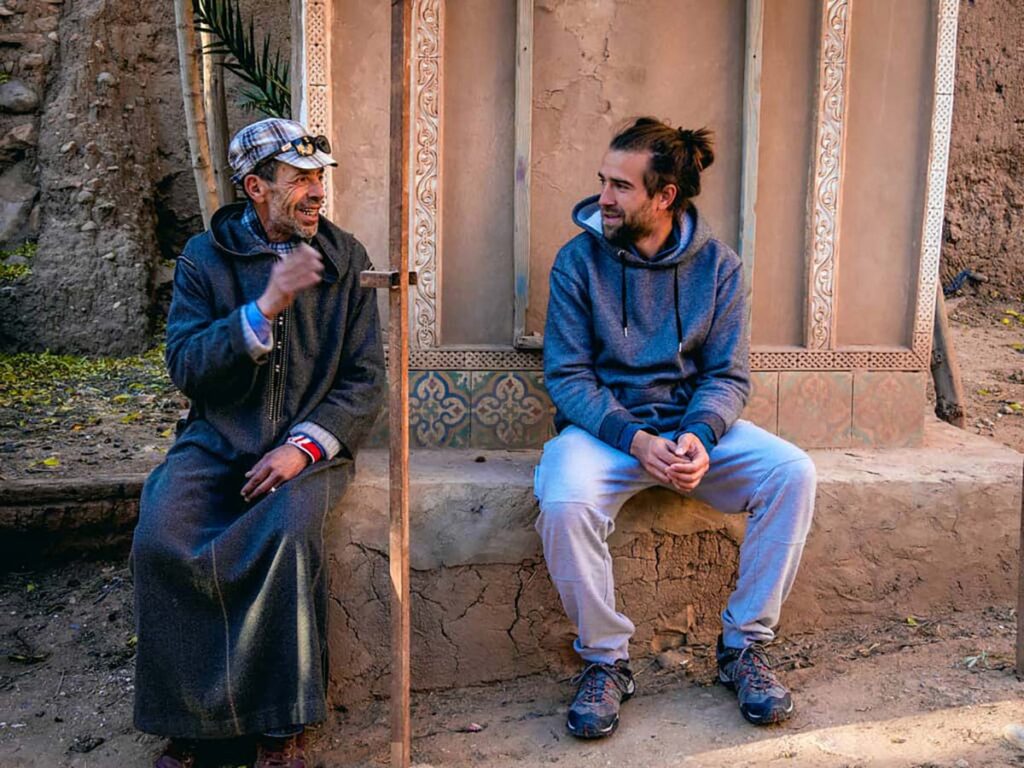
3. Learn Basic Arabic Phrases:
- While many Moroccans speak French or English, learning a few basic Arabic phrases can be helpful and endearing to locals.
4. Prepare for Festivities:
- Familiarize yourself with Eid customs and rituals to fully appreciate the celebrations.
- Be ready to participate in local traditions and try various festive foods.
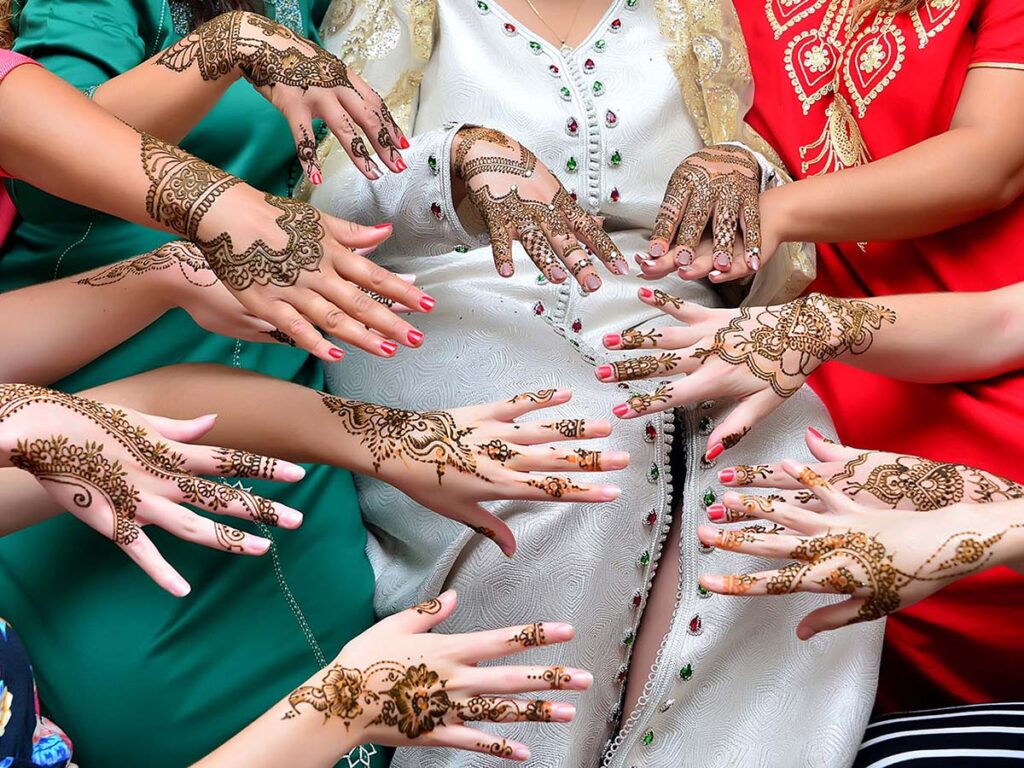
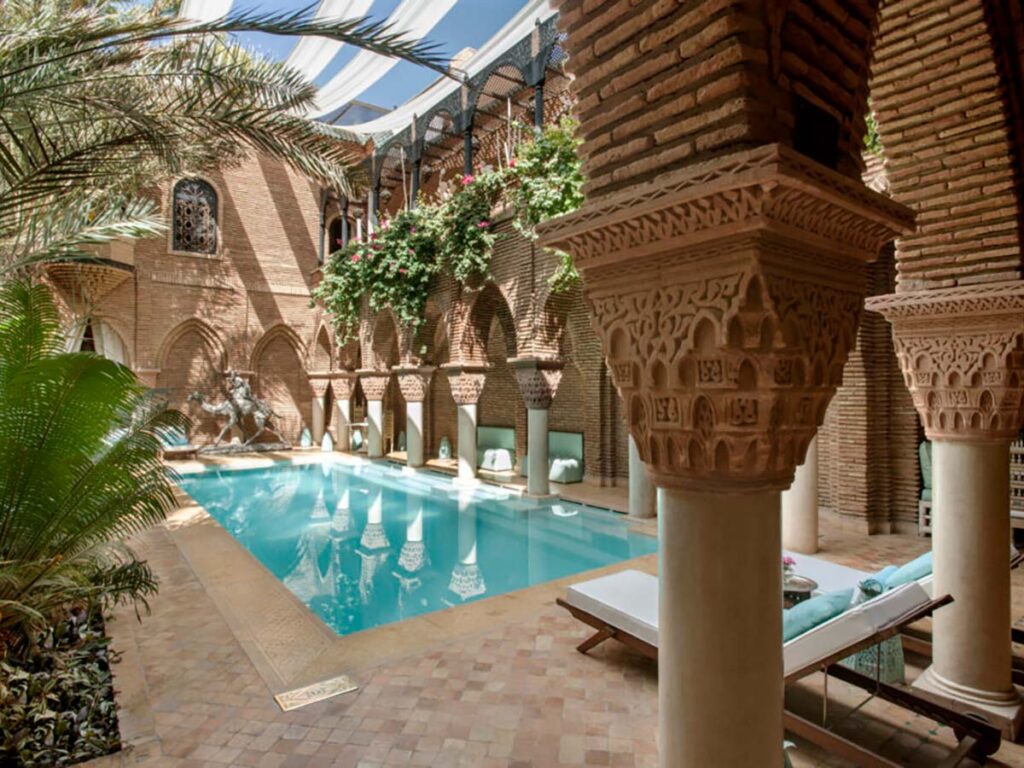
5. Accommodation and Transportation:
- Book your accommodation well in advance, as places fill up quickly during Eid.
- Consider staying in traditional riads for an authentic Moroccan experience.
- Plan your transportation ahead of time, whether renting a car or using public transport.
6. Health and Safety:
- Stay hydrated and protect yourself from the sun with hats, sunglasses, and sunscreen.
- Be mindful of food and water safety; stick to bottled water and well-cooked foods.
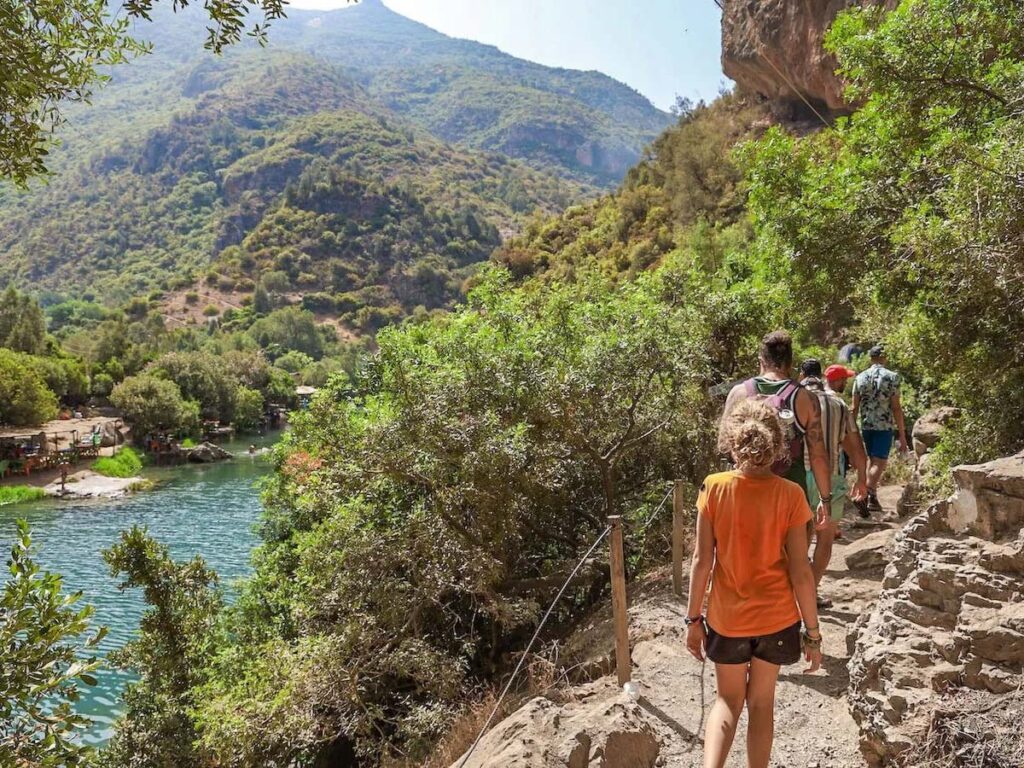
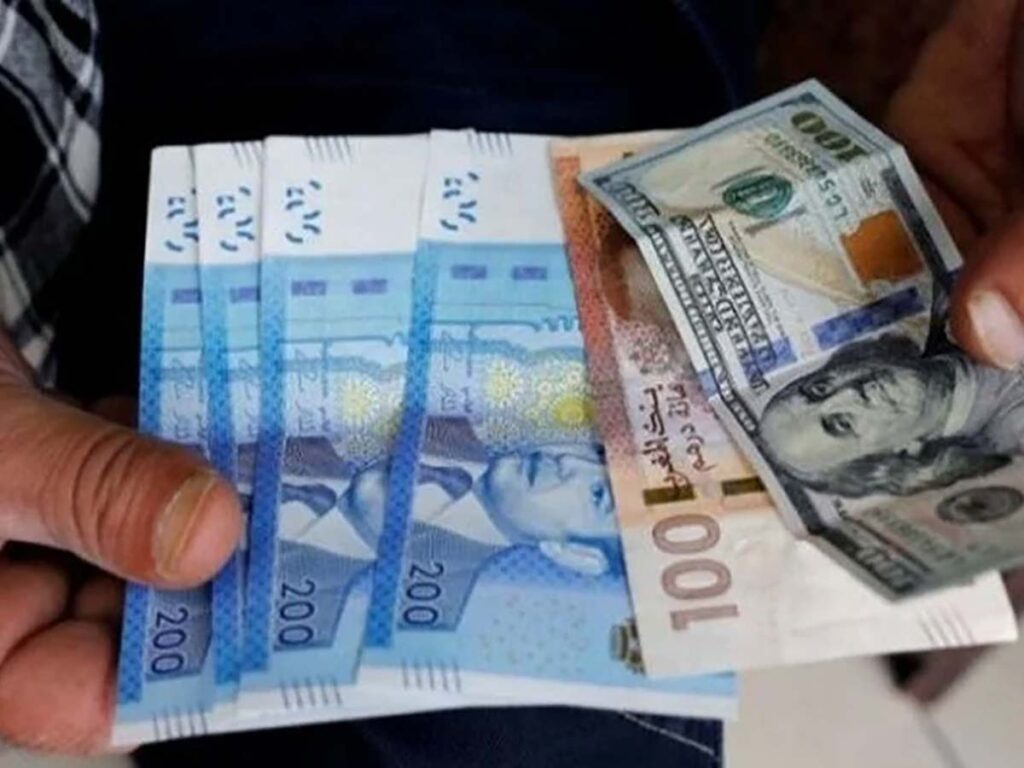
7. Currency and Payments:
- Have some local currency (Moroccan Dirham) on hand for markets and smaller vendors.
- Credit cards are widely accepted, but it’s good to have cash for smaller transactions.
By preparing thoughtfully, you can ensure a smooth and enriching visit to Morocco during the vibrant celebrations of Eid Al-Adha.
Specific Eid Al-Adha Preparation Tips:
Prepare for Eid Al-Adha in Morocco with our essential tips. From understanding rituals to embracing local customs, make the most of your cultural journey.
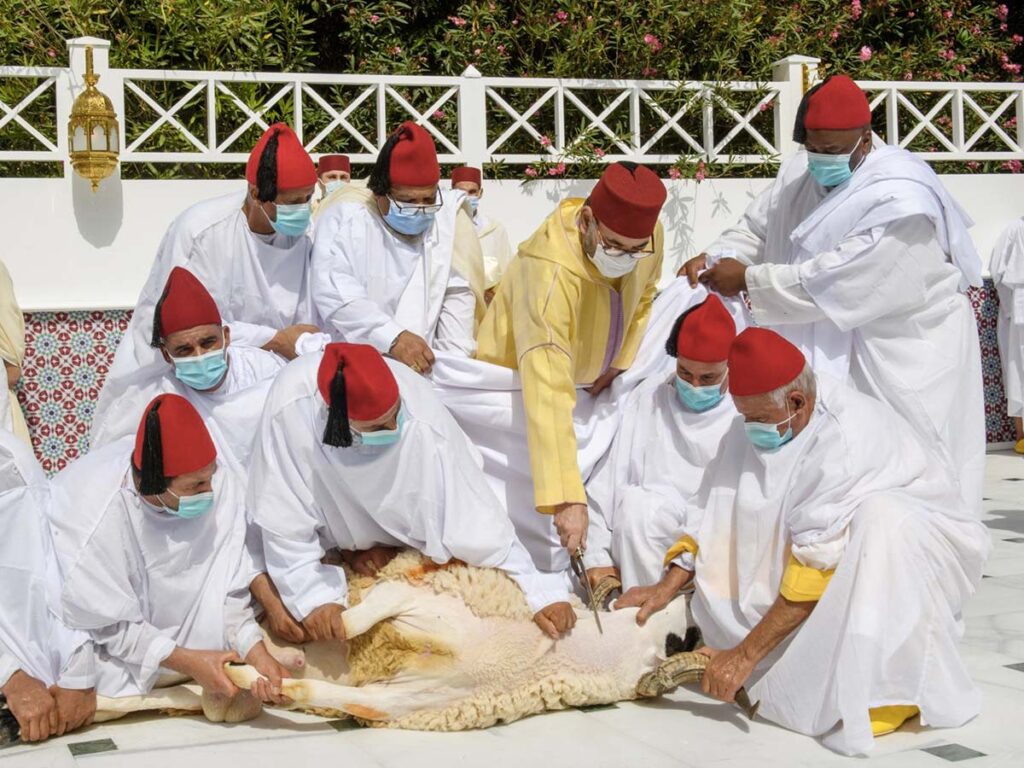
1. Understand the Rituals:
- Learn about the significance of the sacrificial ritual and the customs associated with it.
- Be respectful and sensitive towards the traditions, especially during the sacrifice.
2. Participate Respectfully:
- If invited to a local family’s home for the celebration, accept the invitation graciously.
- Be prepared to share in the communal meal and observe the practices with respect.
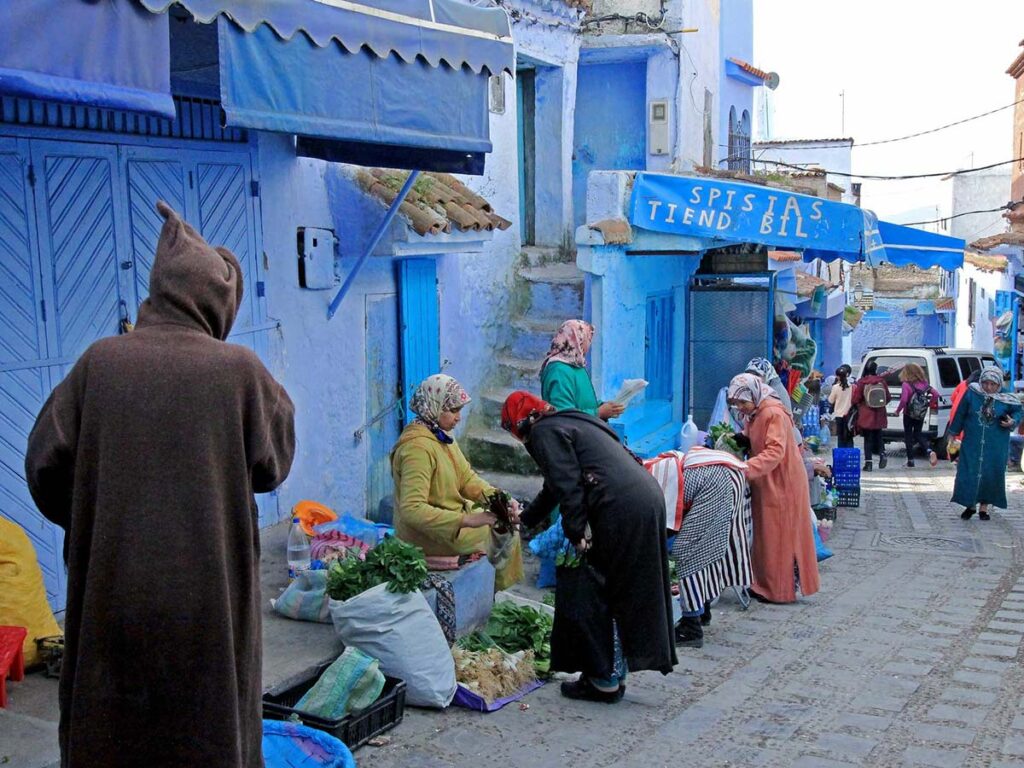
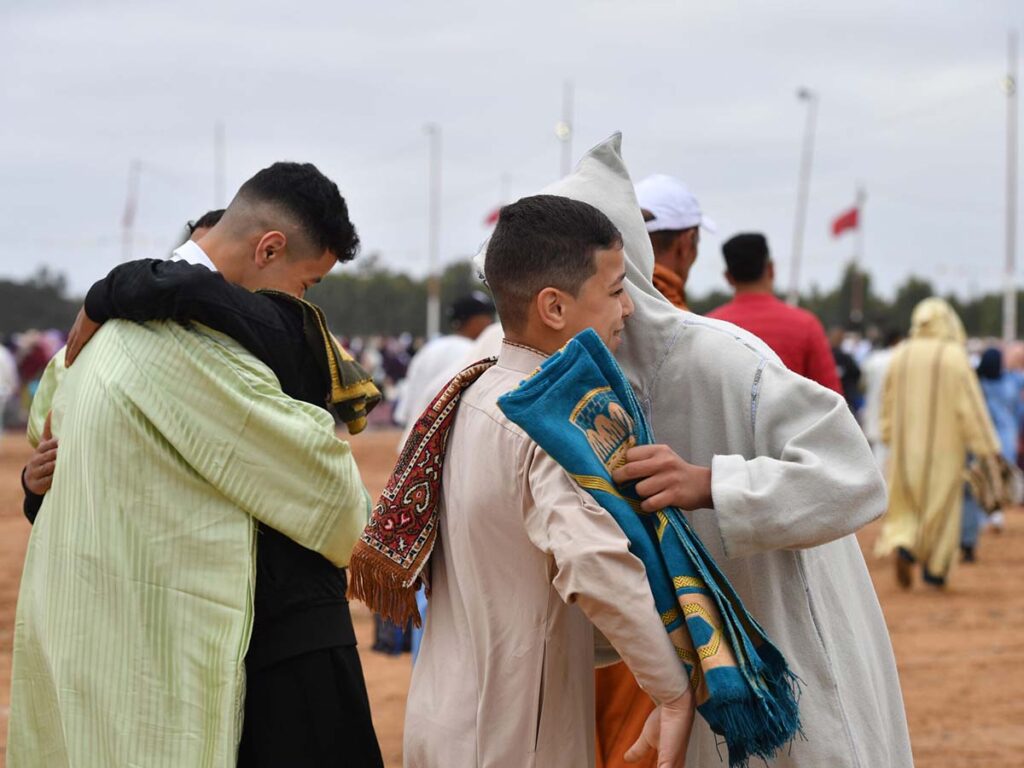
3. Dress Appropriately for Eid Prayers:
- If you plan to attend Eid prayers, dress conservatively and appropriately for a religious setting.
- Women may consider bringing a headscarf for visiting mosques.
4. Understand Holiday Closures:
- Be aware that many businesses and public services may be closed or have reduced hours during Eid.
- Plan your activities and travel around these closures.
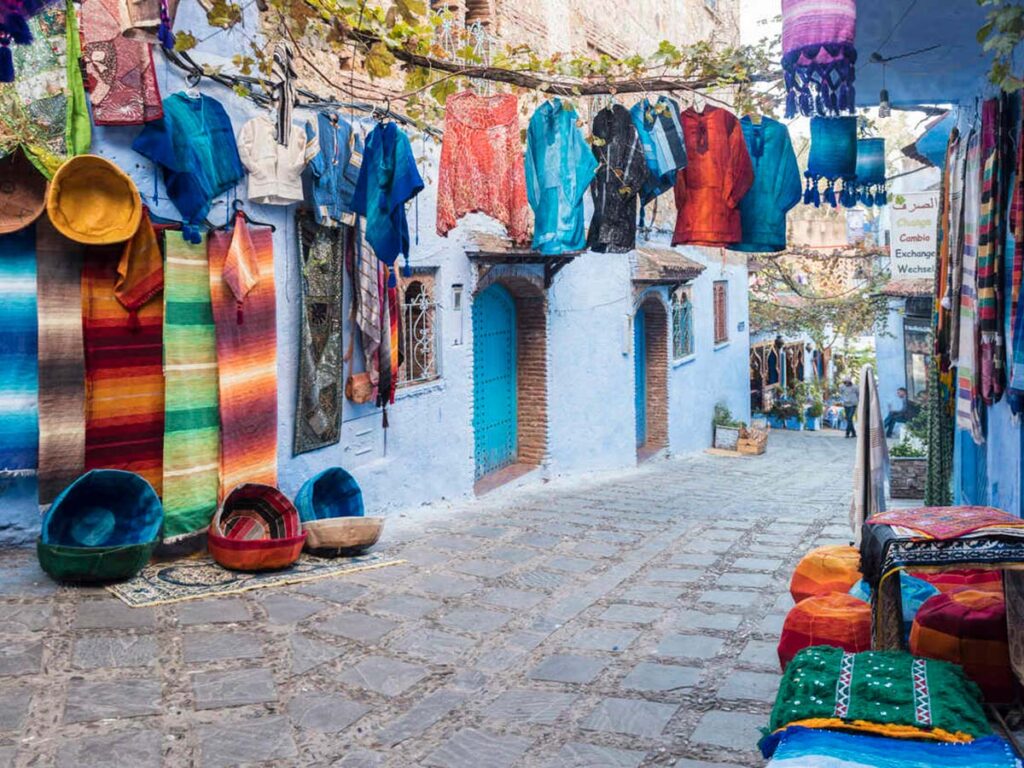
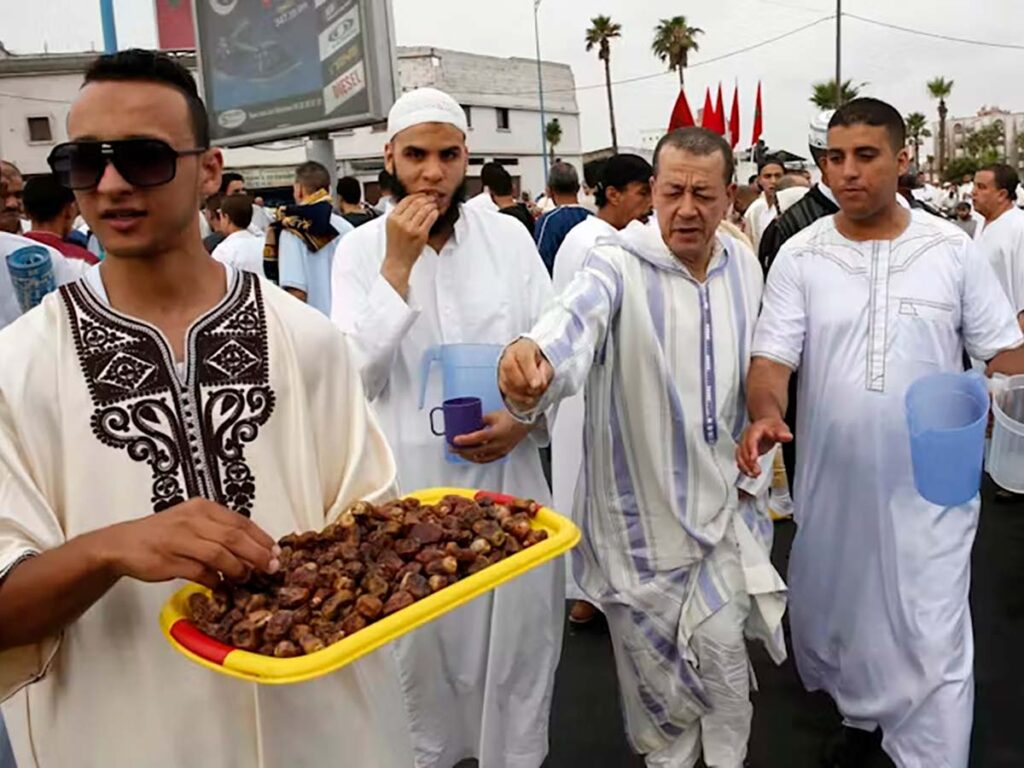
5. Engage in Acts of Charity:
- Eid Al-Adha is a time for giving. Consider donating to local charities or participating in community service.
- This will not only enrich your experience but also align with the spirit of the holiday.
By preparing thoughtfully and respectfully, you can ensure a smooth and enriching visit to Morocco during the vibrant celebrations of Eid Al-Adha.
Experiencing Eid Al-Adha in Morocco:
Experiencing Eid Al-Adha in Morocco is a profound and immersive cultural journey. The entire country pulses with life, joy, and a deep sense of tradition. Here’s a glimpse into what you might encounter:
The streets of Fez come alive with music and dance, and families gather to share sumptuous meals. I had the privilege of joining a local family for a traditional feast. The warmth and hospitality were palpable as we sat together, savoring dishes like Mechoui, a succulent roasted lamb prepared specially for the occasion. The communal spirit was infectious; neighbors visited each other’s homes, sharing sweets and stories.
In Marrakesh, the vibrant Jemaa el-Fnaa square buzzes with activity. Street performers, storytellers, and musicians add to the festive atmosphere. The air is filled with the aroma of spices and grilled meat from countless food stalls. Watching the preparations for the sacrificial ritual at dawn was a humbling experience, underscoring the holiday’s deep religious significance.
Traveling to the coastal city of Essaouira, I witnessed a different pace of celebration. The serene beaches provided a tranquil setting for families to gather and celebrate together. The blend of traditional customs with the city’s laid-back vibe made it a unique experience.
Attending the Eid prayer at the iconic Hassan II Mosque in Casablanca was awe-inspiring. The mosque, one of the largest in the world, was filled with worshippers dressed in their finest attire, all coming together in a powerful display of faith and unity. The beauty of the prayer service, with thousands of voices rising in unison, left a lasting impression.
Throughout my journey, I was struck by the sense of community and generosity that defines Eid Al-Adha in Morocco. Strangers became friends, inviting me into their homes and lives with open arms. This celebration is not just about the rituals and the feasts, but about the connections made and the shared humanity experienced.
Whether you’re exploring the ancient medinas of Fez, the bustling markets of Marrakesh, or the serene beaches of Essaouira, Eid Al-Adha in Morocco is a rich tapestry of tradition, hospitality, and joy. Each city offers its own unique flavor of the celebration, making every moment a memorable part of the journey.
Food and Festivities:
Eid Al-Adha in Morocco is a feast for the senses, where culinary traditions take center stage and the celebration of food brings people together in joyous harmony. Here’s a look at the delicious dishes and vibrant festivities you can expect during this special time.
Traditional Moroccan Dishes:
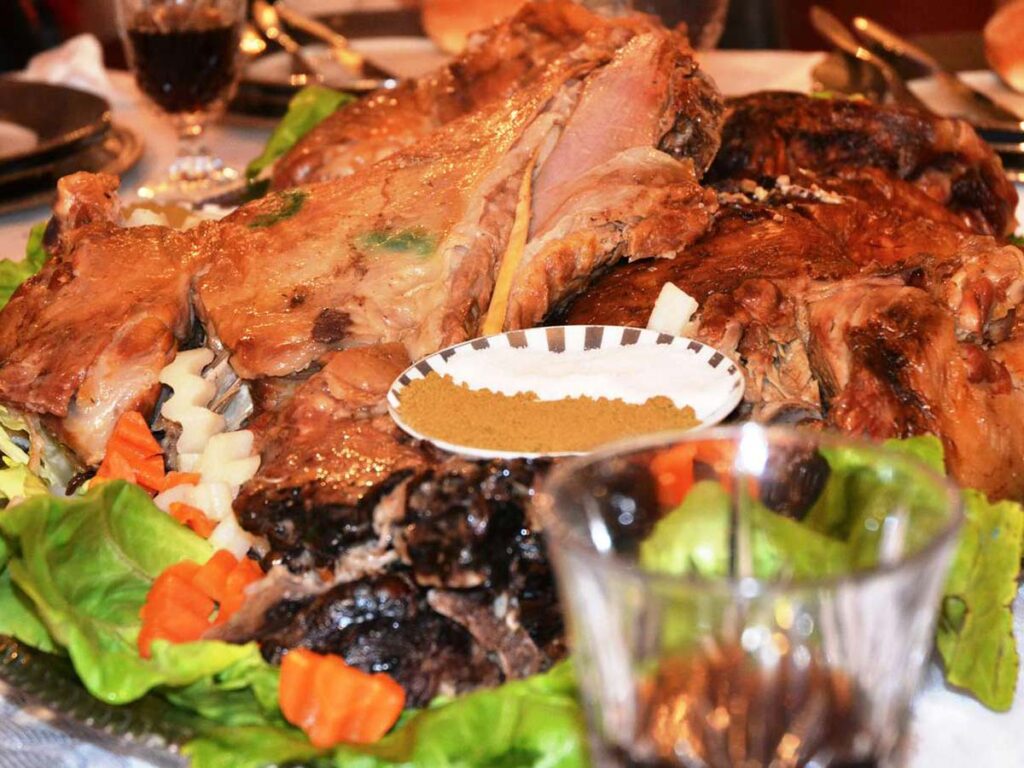
1. Mechoui (Roast Lamb):
- The star of the Eid Al-Adha feast, Mechoui is a whole lamb seasoned with aromatic spices and slow-roasted until tender. The lamb is often prepared on a spit over an open fire, resulting in crispy skin and succulent meat that melts in your mouth. It’s usually served with a sprinkle of cumin and salt for added flavor.
2. Couscous with Lamb:
- A quintessential Moroccan dish, couscous is often prepared with tender lamb, vegetables, and a rich broth. The fluffy grains are steamed to perfection and served with a savory stew that includes chickpeas, carrots, zucchini, and a medley of spices like cinnamon, ginger, and saffron.
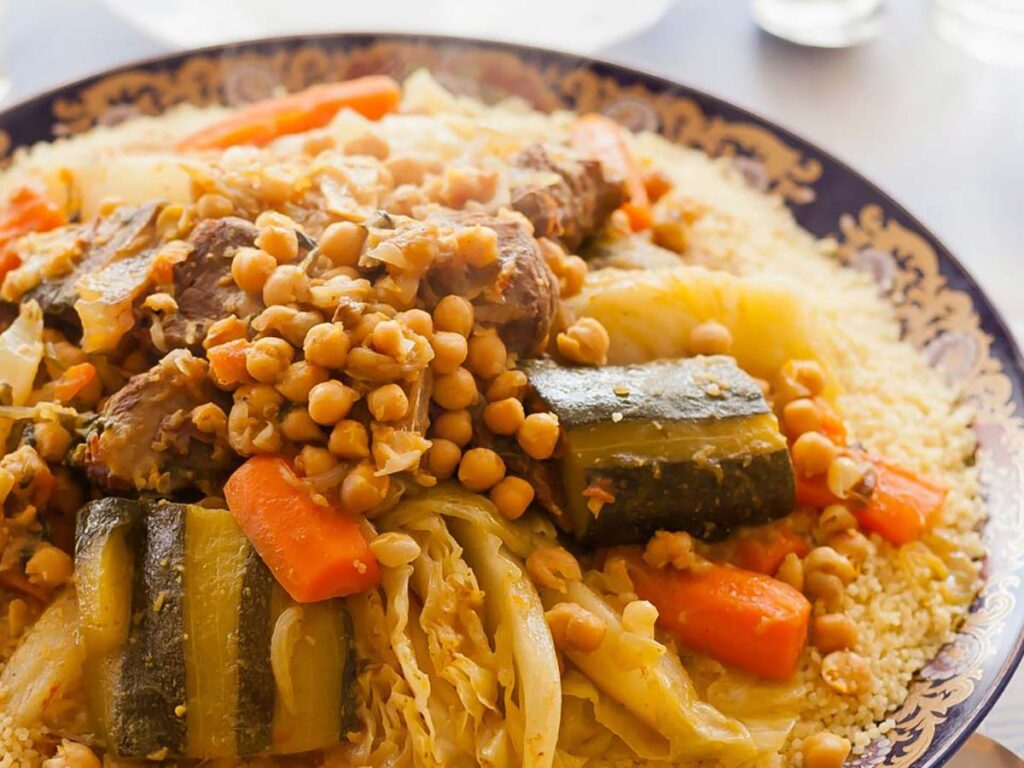
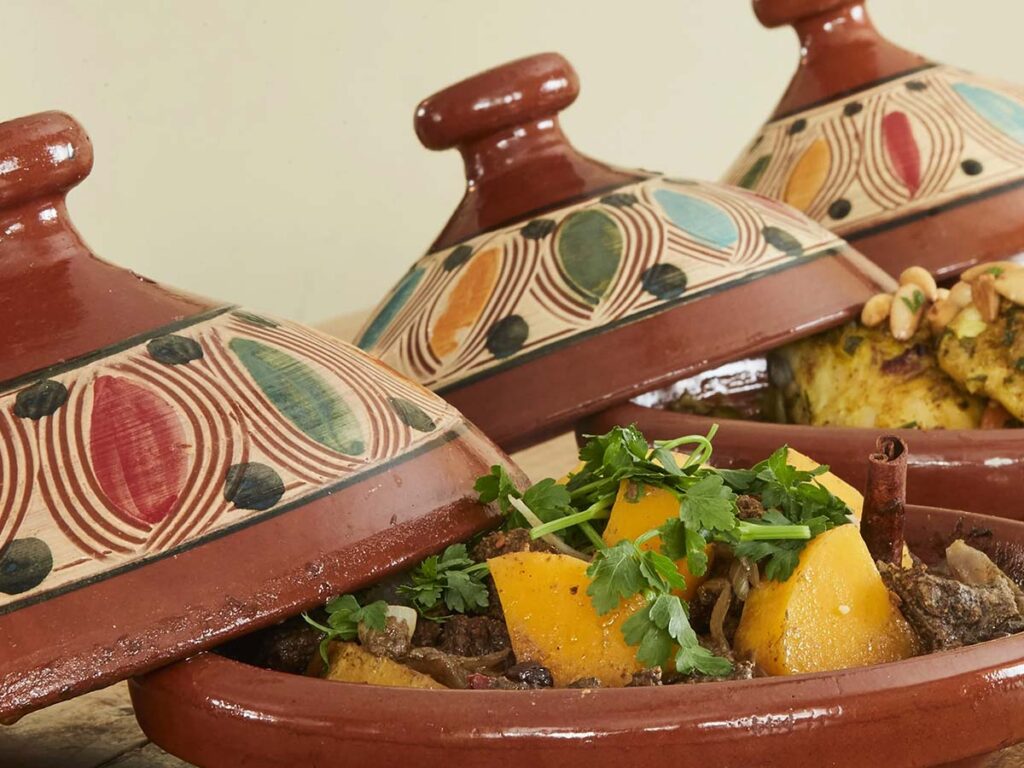
3. Tagine:
- This slow-cooked stew, named after the earthenware pot in which it’s cooked, is a staple of Moroccan cuisine. During Eid, you’ll find tagines made with lamb or beef, prunes, almonds, and a fragrant blend of spices including turmeric, cinnamon, and ginger. The result is a sweet and savory dish that is deeply satisfying.
4. Rfissa:
- Rfissa is a traditional dish made from shredded bread (usually msemen or rghaif) soaked in a rich, spiced chicken and lentil stew. It’s often garnished with fenugreek seeds and a variety of spices, creating a hearty and flavorful meal.
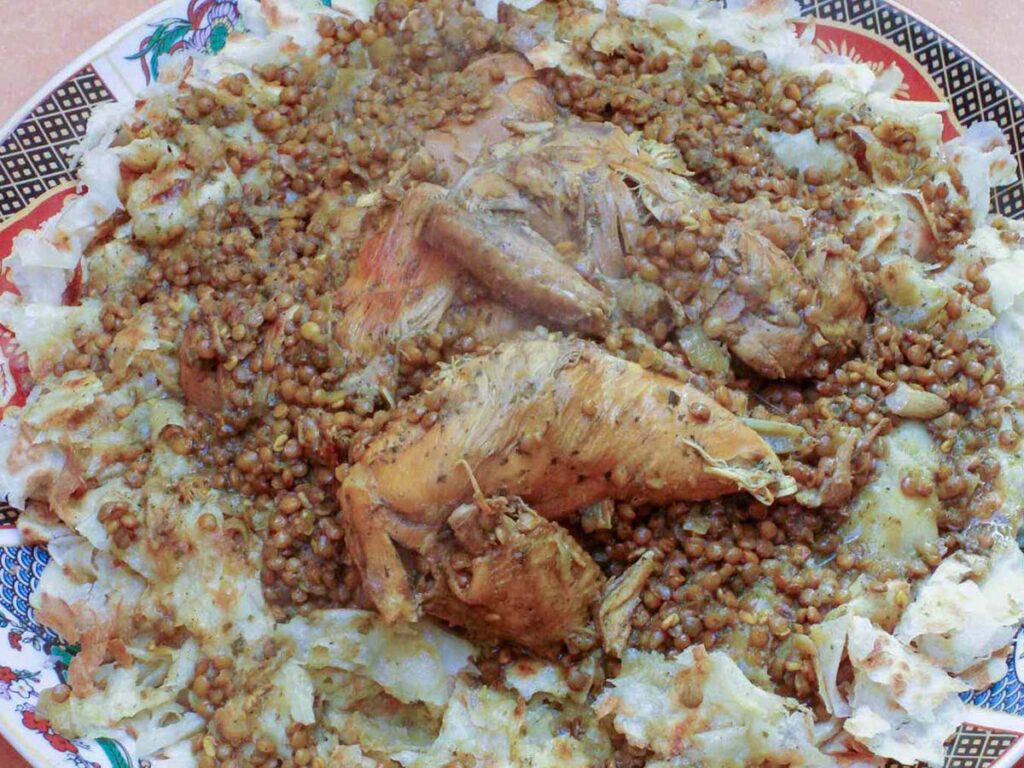
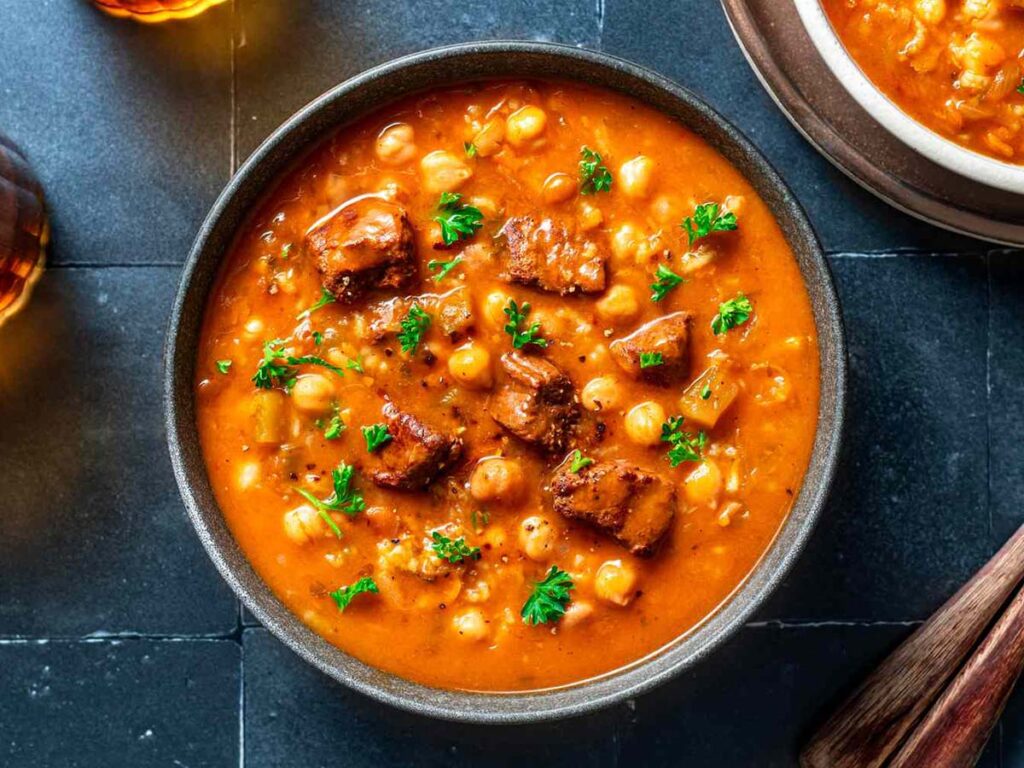
5. Harira:
- This hearty soup is a favorite during festive occasions. Made with tomatoes, lentils, chickpeas, and a variety of herbs and spices, Harira is often enjoyed as a starter during Eid. It’s typically served with dates and chebakia, a sweet sesame cookie.
Special Meals and Street Food
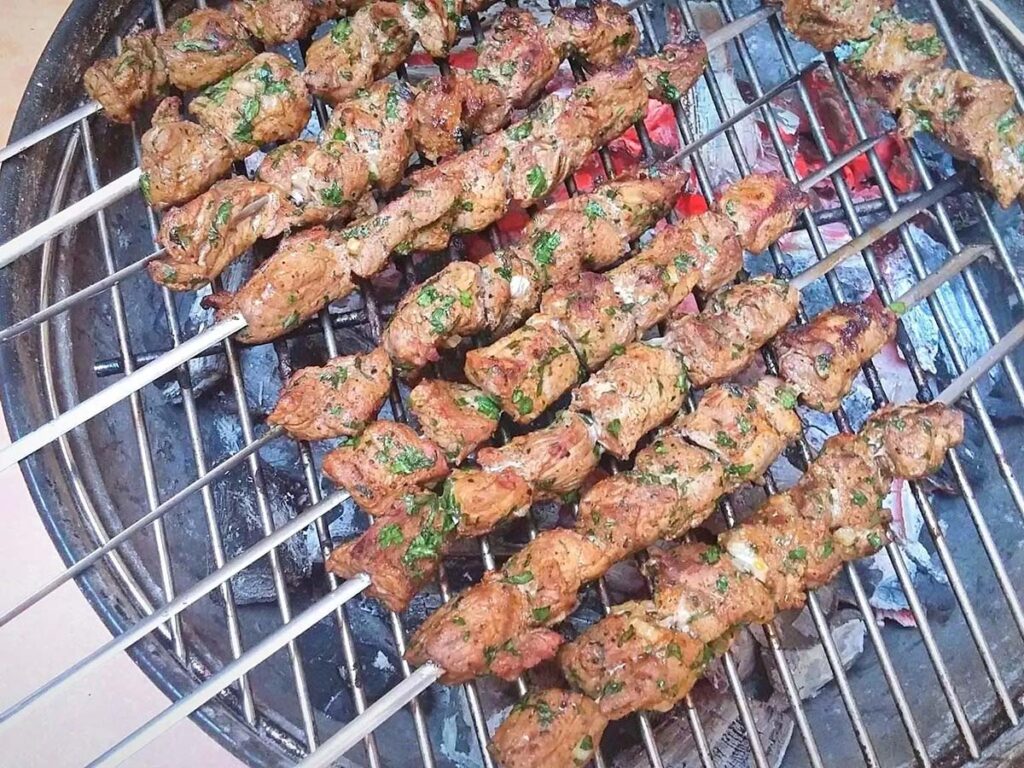
1. Brochettes:
- Moroccan kebabs, or brochettes, are a popular street food, especially during Eid. Skewers of marinated lamb or beef are grilled over open flames and served with fresh bread, making for a delicious and convenient snack.
2. Pastilla:
- A savory-sweet pie, pastilla combines layers of flaky pastry with a filling of spiced meat (usually pigeon or chicken), almonds, and eggs. It’s dusted with powdered sugar and cinnamon, creating a unique and delectable dish.
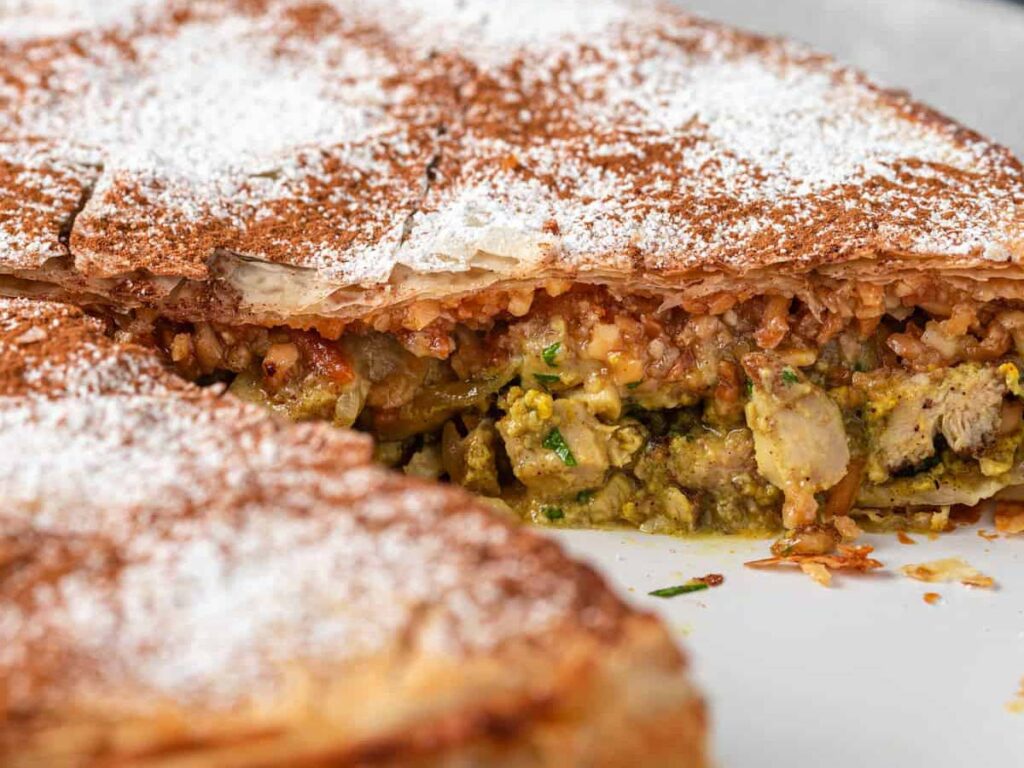
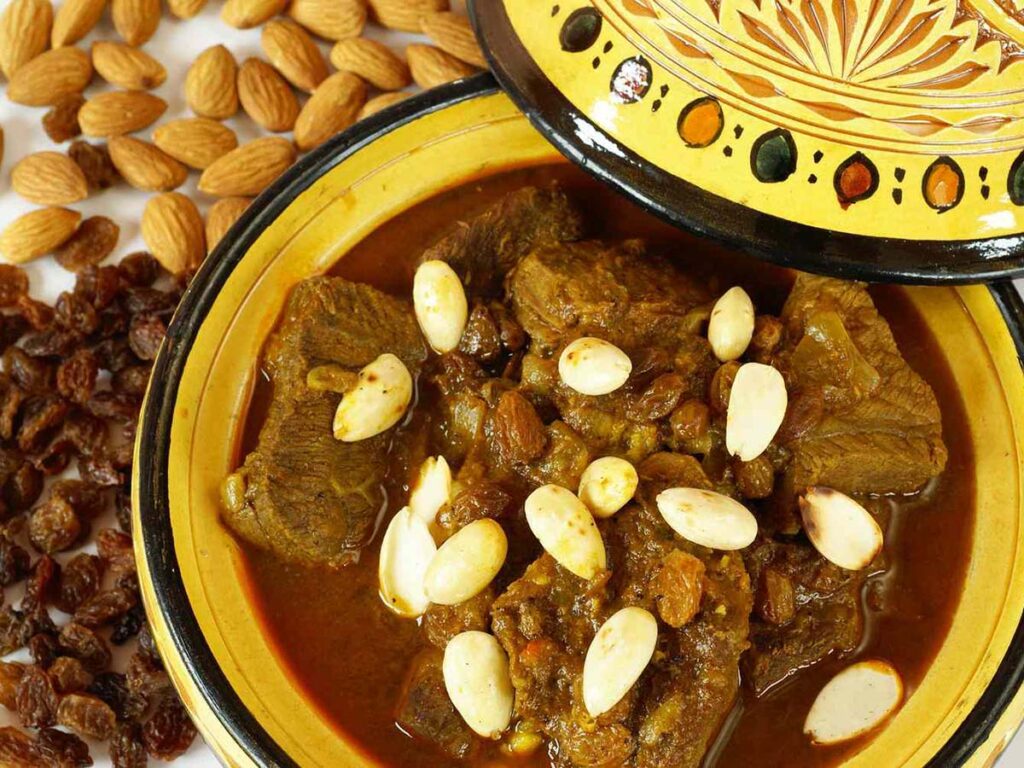
3. Mrouzia:
- A special lamb dish prepared with honey, raisins, and almonds, Mrouzia is a rich and sweet treat that balances the savory flavors of the meat with the sweetness of the fruits and honey.
4. Makouda:
- These potato fritters are a favorite street food, especially during festive times. Crispy on the outside and soft on the inside, makouda are often served with spicy harissa sauce.
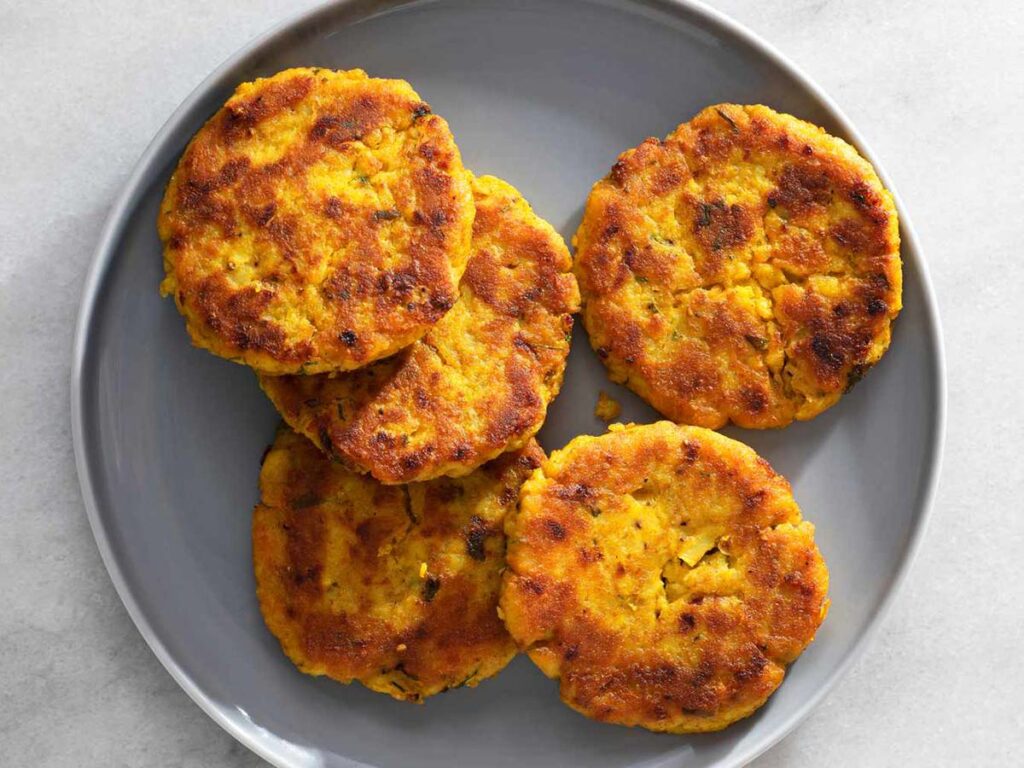
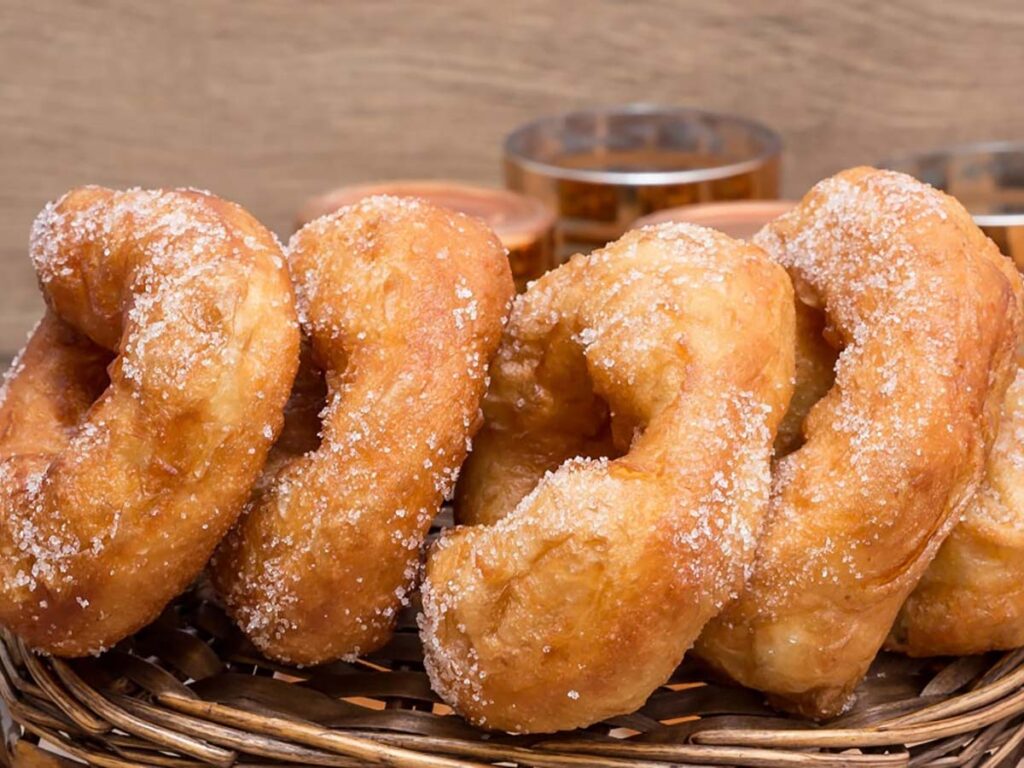
5. Sfenj:
- These Moroccan doughnuts are a popular treat during Eid. Made from a simple yeast dough, sfenj are fried until golden and dusted with sugar. They’re best enjoyed fresh and hot, often with a cup of mint tea.
Culinary Experiences:
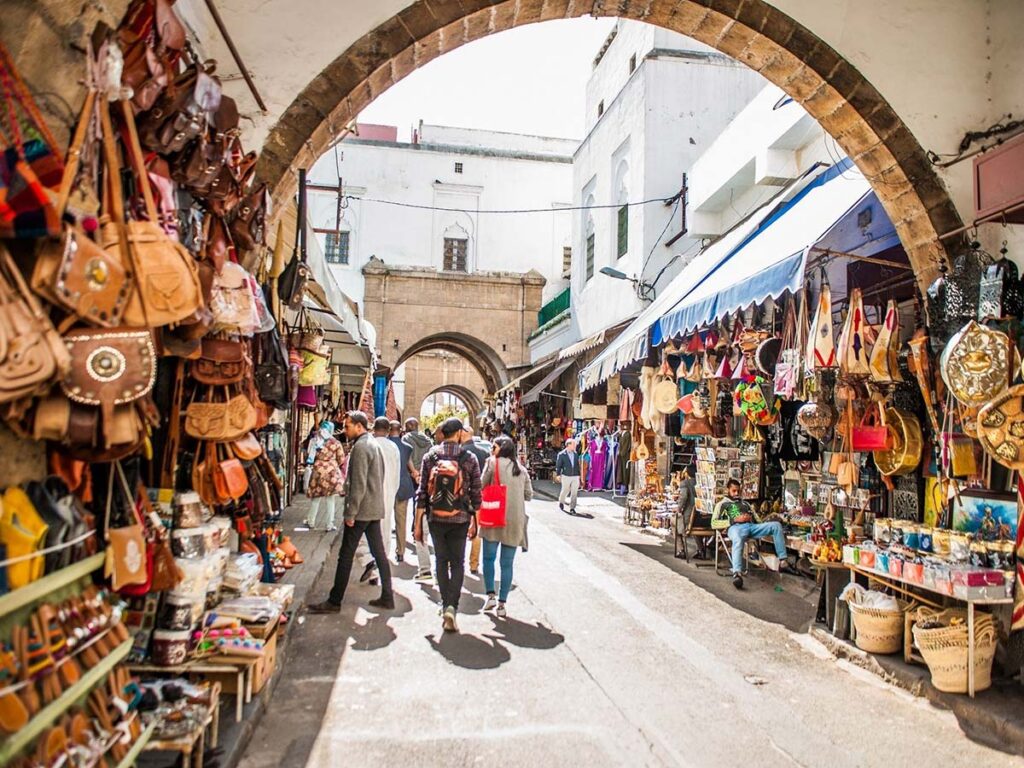
1. Market Visits:
- Exploring the bustling souks and markets is a must during Eid. The vibrant stalls are filled with spices, fresh produce, and an array of sweets. It’s a sensory overload that gives you a true taste of Moroccan culture.
2. Engage with the Local Culture
- Many cities offer cooking classes where you can learn to prepare traditional Moroccan dishes. These classes often include a market tour, allowing you to select fresh ingredients and learn about their uses.
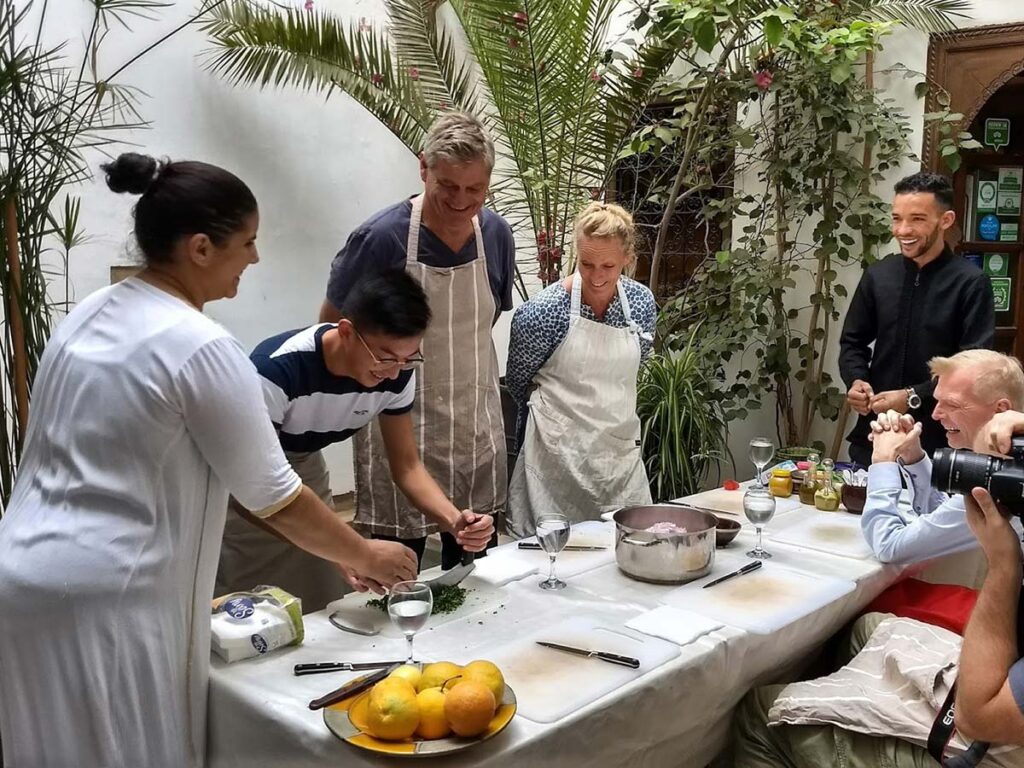
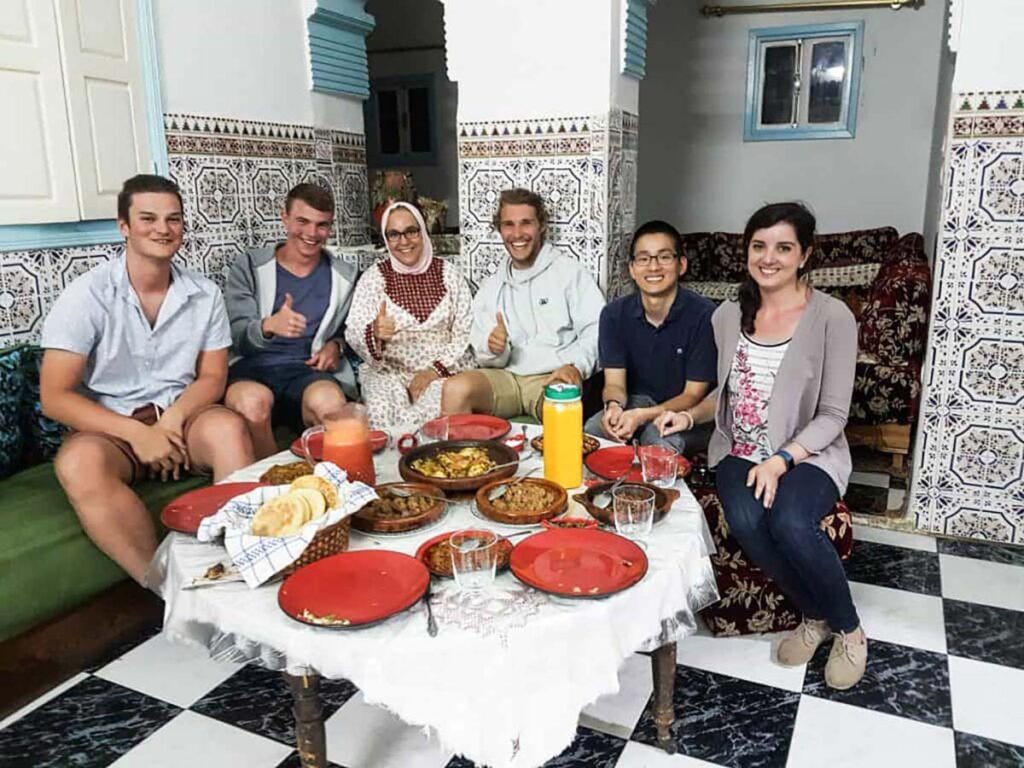
3. Family Feasts:
- One of the most rewarding experiences is being invited to a local family’s home for an Eid feast. It’s an opportunity to share in the traditions, enjoy home-cooked meals, and experience Moroccan hospitality firsthand.
Eid Al-Adha in Morocco is a culinary celebration that showcases the country’s rich gastronomic heritage. From sumptuous feasts to street food delights, every meal is a testament to the love and care that goes into Moroccan cooking.
Cultural Insights:
Visiting Morocco during Eid Al-Adha offers a unique opportunity to immerse yourself in the country’s rich cultural tapestry. The celebrations highlight the warmth and hospitality that are hallmarks of Moroccan society, providing deeper insights into their customs and traditions.
Observations About Moroccan Culture:
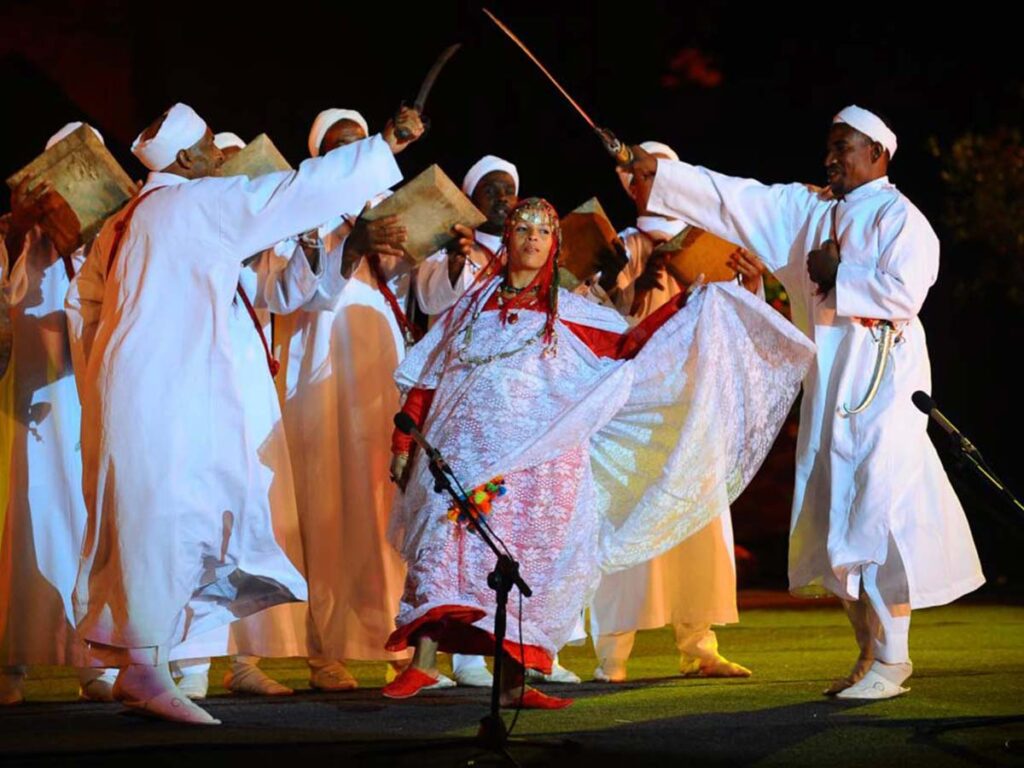
1. Strong Sense of Community:
- Eid Al-Adha is a communal event that brings families and neighbors together. It’s a time when Moroccans open their homes and hearts to others, reinforcing the strong sense of community that permeates Moroccan culture. Sharing meals, visiting relatives, and giving to those in need are integral parts of the celebration.
2. Hospitality and Generosity:
- Moroccan hospitality, or “Diyafa,” is legendary. During Eid, this hospitality is even more pronounced. Guests are treated with utmost respect and generosity, often being invited to share in the sacrificial feast and partake in family traditions. This openness creates an inviting atmosphere for visitors.
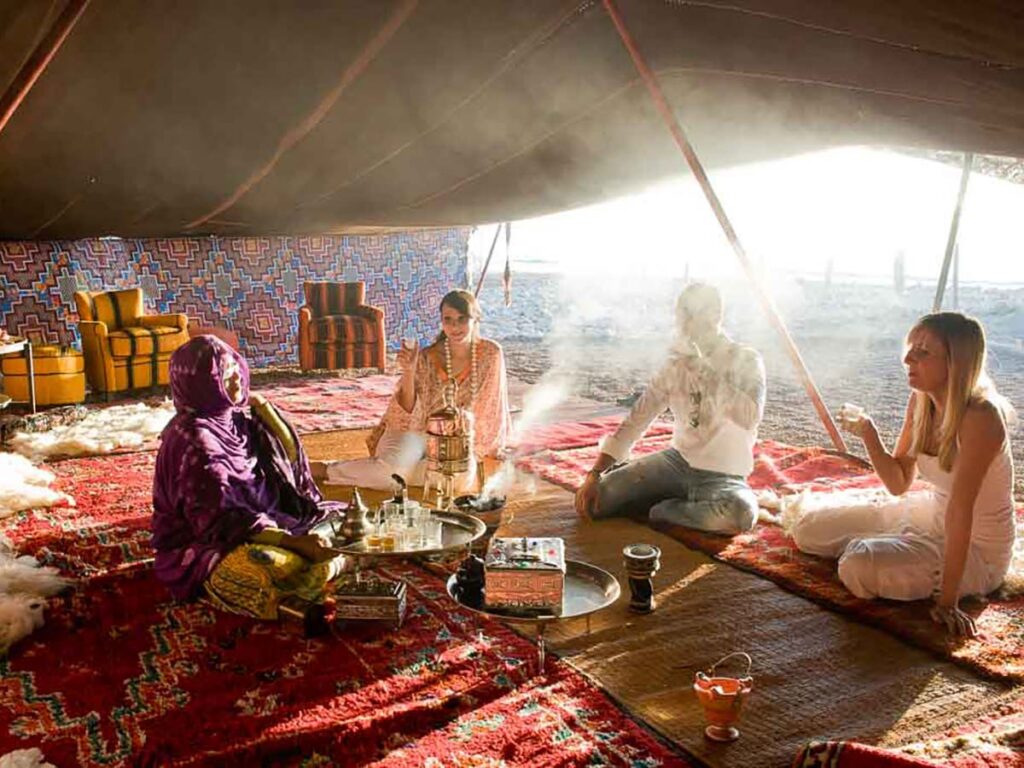
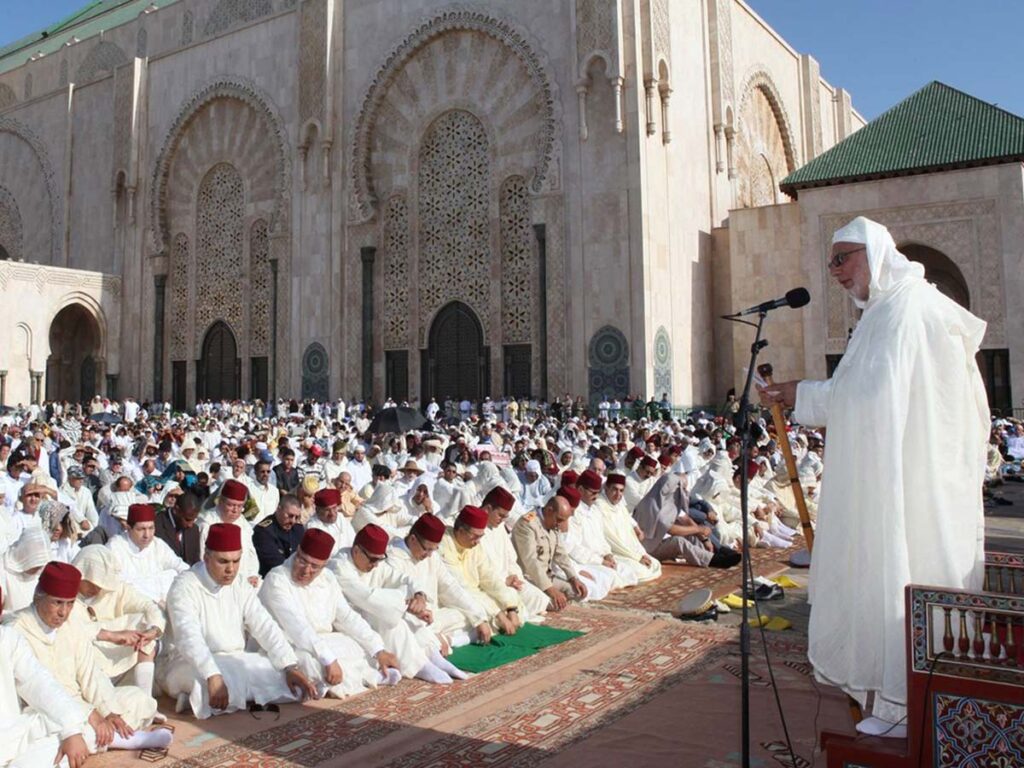
3. Religious Devotion:
- Islam plays a central role in Moroccan life, and Eid Al-Adha is a reflection of this deep religious devotion. The day begins with special prayers at local mosques, and the sacrificial ritual is performed with great reverence. This religious dedication is evident in the way families prepare for and celebrate the holiday.
4. Cultural Diversity:
- Morocco is a melting pot of Arab, Berber, and Andalusian influences. This diversity is reflected in the various ways Eid is celebrated across different regions. From the bustling cities to the tranquil countryside, each area offers a unique perspective on the holiday.
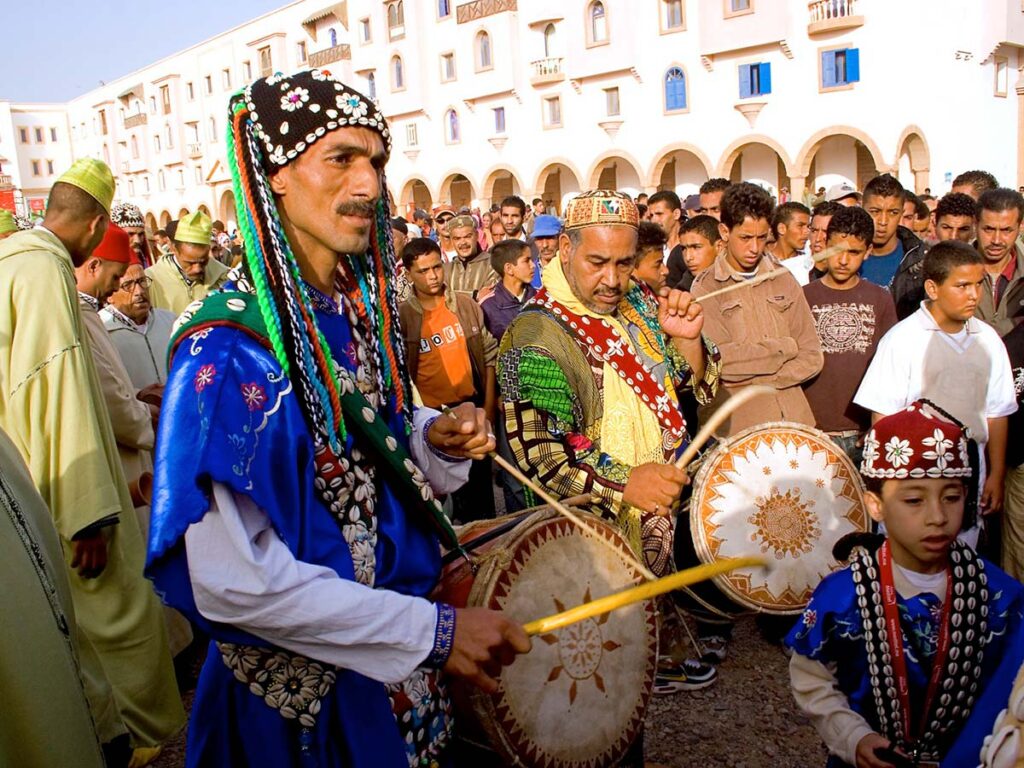
Interaction with Locals:

1. Warm Welcomes:
- Visitors often find themselves welcomed with open arms. Moroccans are keen to share their customs and traditions, making it easy for travelers to engage and learn. Accepting an invitation to a family’s home for an Eid meal is a common and cherished experience.
2. Sharing Meals:
- Food is a central part of Moroccan hospitality. During Eid, families prepare large meals and share them with guests, neighbors, and the less fortunate. This practice not only highlights the culinary richness of Morocco but also emphasizes the importance of generosity and community.
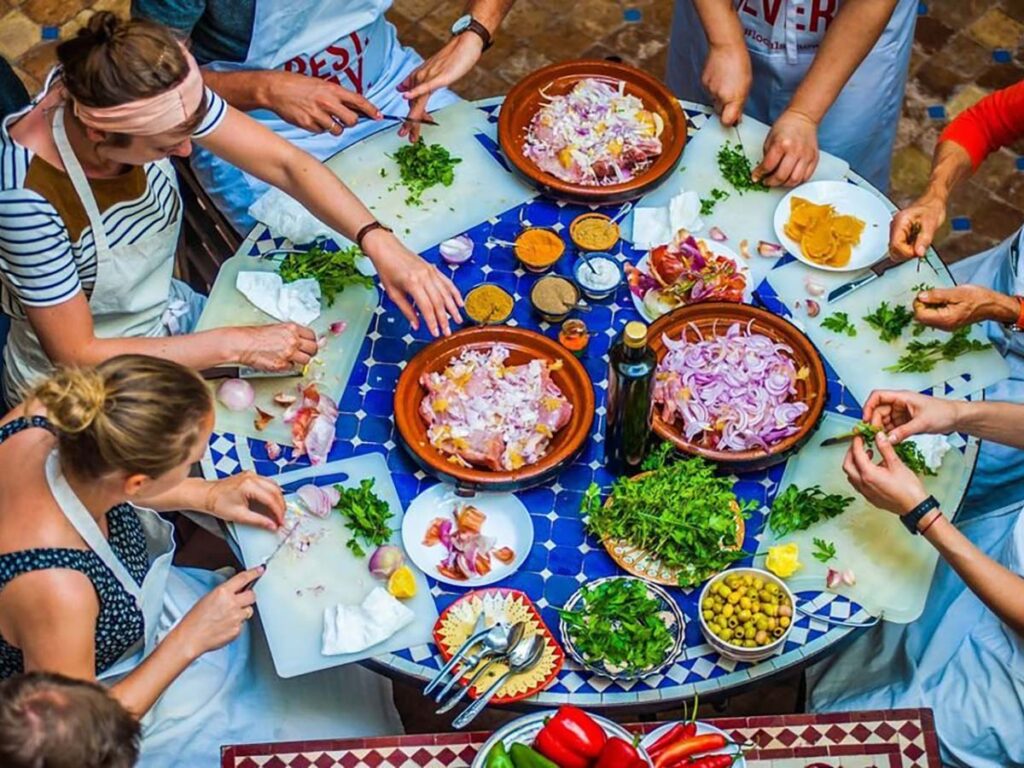
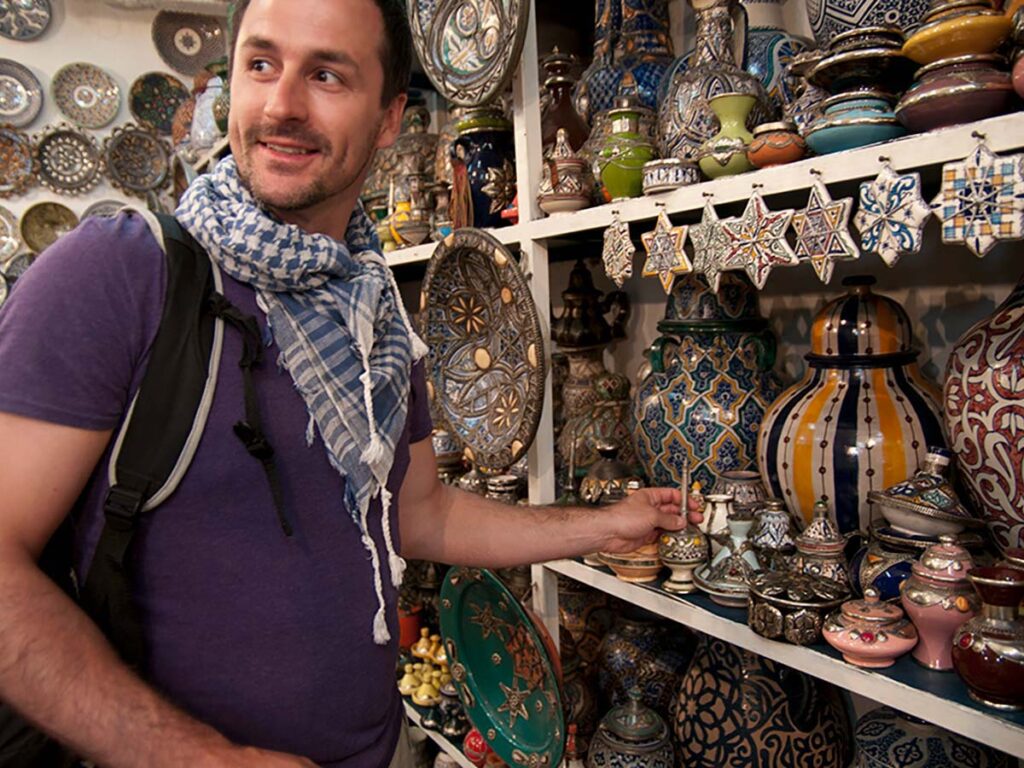
3. Participating in Traditions:
- Visitors are encouraged to participate in Eid traditions, such as attending the morning prayers, observing the sacrificial rituals, and joining in the feasts. Engaging in these customs provides a deeper understanding of their significance and fosters a sense of connection with the locals.
Understanding Their Customs:
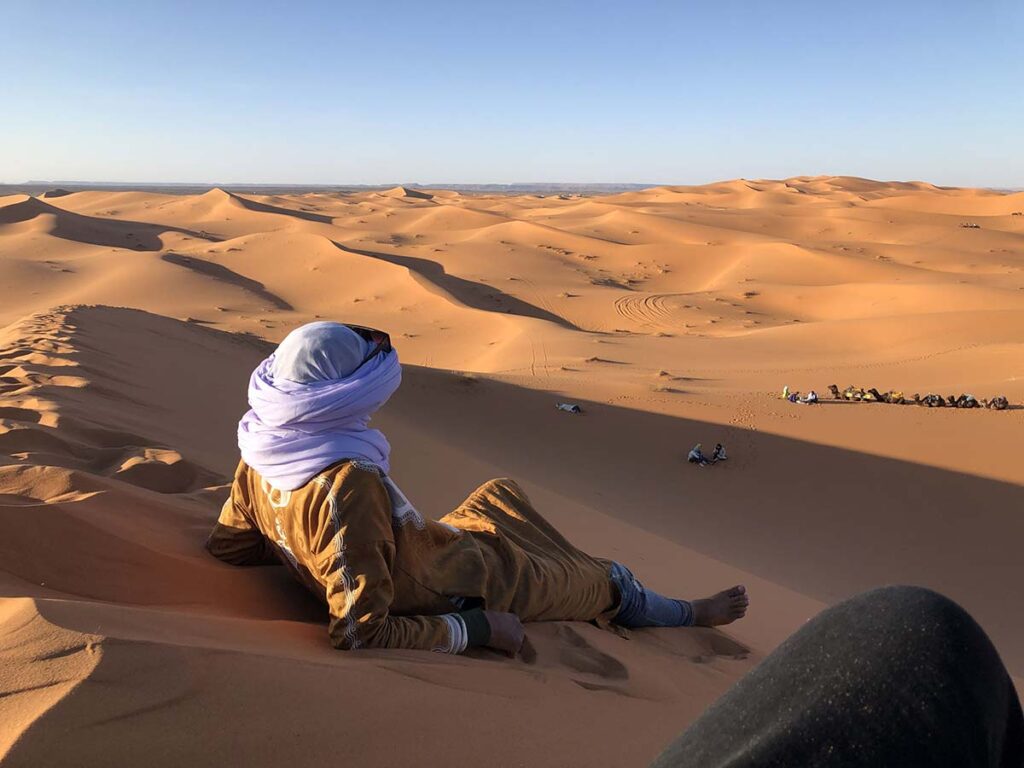
1. Respect for Traditions:
- Showing respect for Moroccan customs is crucial, especially during a significant religious holiday like Eid Al-Adha. Dressing modestly, being mindful of local etiquette, and understanding the importance of the rituals are key aspects of showing respect.
2. Acts of Charity:
- Charity, or “Zakat,” is an important aspect of Eid Al-Adha. Many families distribute meat from the sacrificial animal to the less fortunate, reinforcing the values of compassion and generosity. Participating in or witnessing these acts can be a profound experience for visitors.
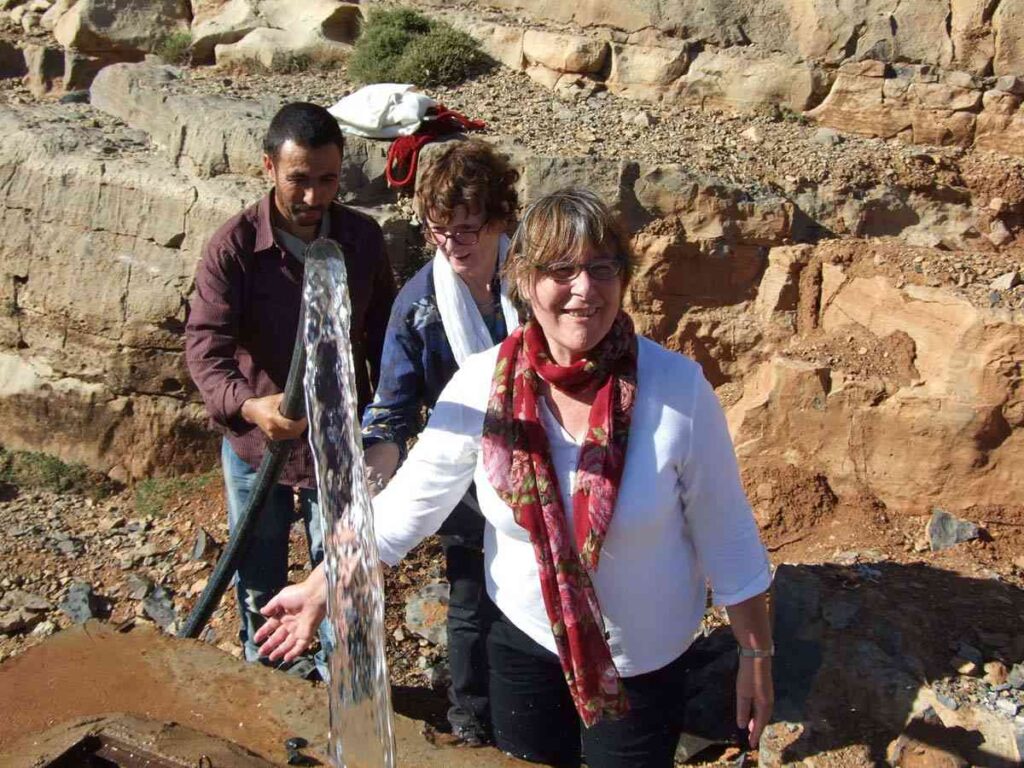
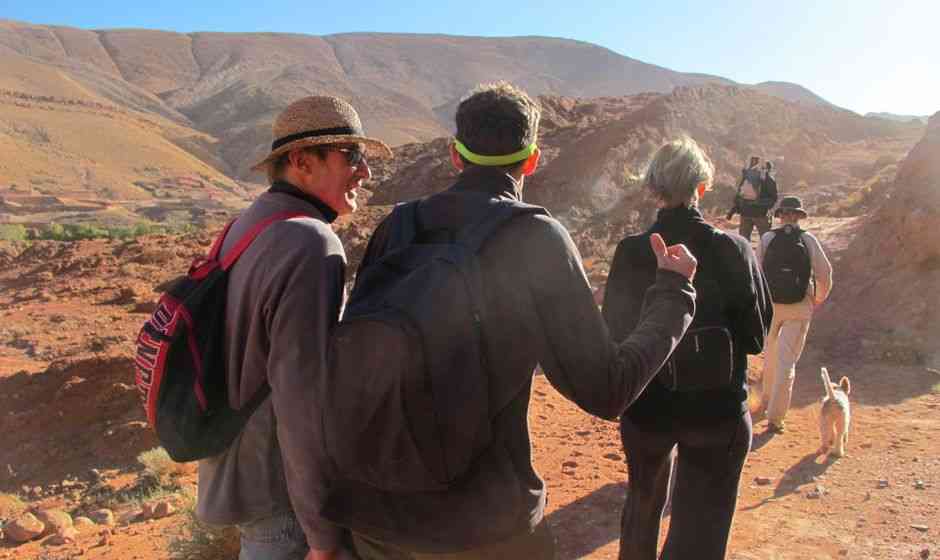
3. Cultural Etiquette:
- Charity, or “Zakat,” is an important aspect of Eid Al-Adha. Many families distribute meat from the sacrificial animal to the less fortunate, reinforcing the values of compassion and generosity. Participating in or witnessing these acts can be a profound experience for visitors.
4. Festive Attire:
- Traditional clothing, such as the djellaba and kaftan, are often worn during Eid. These garments are not only beautiful but also hold cultural significance. Observing or even donning traditional attire can deepen your appreciation for Moroccan culture.
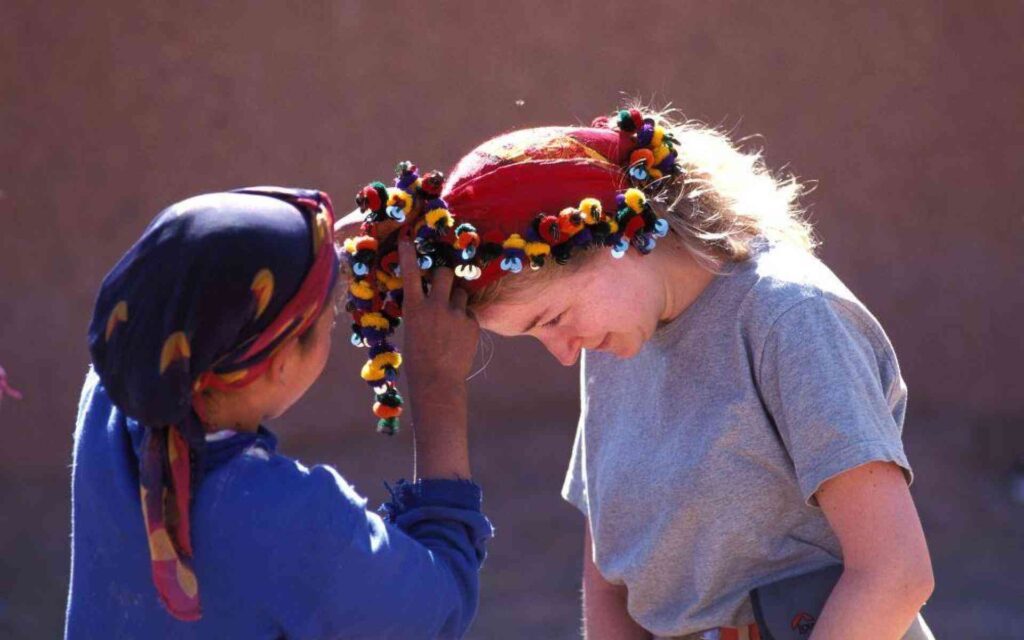
Experiencing Eid Al-Adha in Morocco offers a window into the country’s rich cultural and religious heritage. Through the hospitality of its people, the beauty of its traditions, and the warmth of its community spirit, visitors can gain a profound understanding and appreciation of Moroccan culture.
Practical Tips for Travelers:
Visiting Morocco during Eid Al-Adha is a rewarding experience, but it’s important to plan ahead to make the most of your trip. Here are some practical tips for accommodation, transportation, and navigating through cities during the holiday.
Accommodation Recommendations:
- Book in Advance:
- Eid Al-Adha is a busy travel period in Morocco. Hotels and guesthouses can fill up quickly, so it’s advisable to book your accommodation well in advance to secure the best options.
- Stay in a Riad:
- For an authentic Moroccan experience, consider staying in a riad. These traditional houses with interior courtyards offer a unique and charming atmosphere. Popular cities like Marrakesh, Fez, and Essaouira have many beautiful riads that provide a glimpse into Moroccan architecture and hospitality.
- Consider Different Types of Accommodation:
- Luxury Hotels: Cities like Casablanca and Marrakesh have a range of luxury hotels with modern amenities and excellent service.
- Mid-Range Hotels: There are numerous mid-range hotels that offer comfortable stays without breaking the bank.
- Guesthouses and Hostels: For budget travelers, guesthouses and hostels are great options, often providing cozy settings and opportunities to meet other travelers.
- Location Matters:
- Choose accommodation that is centrally located to easily access major attractions and festivities. Staying in the medina (old city) areas of Marrakesh and Fez can provide a more immersive experience, while modern districts may offer more conveniences.
Transportation Tips:
- Public Transportation:
- Trains: Morocco’s train network, operated by ONCF, is reliable and comfortable. It connects major cities like Casablanca, Rabat, Marrakesh, and Fez. During Eid, trains can be crowded, so booking tickets in advance is recommended.
- Buses: Intercity buses are another option for traveling between cities. Companies like CTM and Supratours offer comfortable and affordable services.
- Trams: Cities like Rabat and Casablanca have tram systems that are efficient for getting around the city.
- Taxis:
- Petits Taxis: These are small, usually red or blue taxis that operate within city limits. They are metered and relatively inexpensive. Make sure the meter is running or agree on a fare before starting your journey.
- Grands Taxis: These are larger taxis that can travel between cities or to more distant locations within a city. They usually operate on a shared basis, but you can hire one privately for a higher fare.
- Car Rentals:
- Renting a car can provide flexibility, especially if you plan to explore multiple regions or rural areas. International and local car rental agencies are available in major cities and airports.
- Navigating During Eid:
- Plan for Traffic: Expect heavier traffic, especially near mosques, markets, and major attractions. Allow extra time for travel.
- Holiday Closures: Many businesses, including shops and restaurants, may close or have reduced hours during Eid. Plan your activities and meals accordingly.
- Walking and Cycling: In cities like Marrakesh and Fez, walking or cycling can be a pleasant way to explore, particularly in the medina areas where cars have limited access.
Tips for Navigating Through Cities:
- Use a Map or Navigation App:
- Having a map or using a navigation app like Google Maps can help you find your way around, especially in the labyrinthine medinas.
- Hire a Local Guide:
- Consider hiring a local guide to help you navigate and provide insights into the history and culture of the area. Guides can be particularly helpful in large, complex medinas like those in Fez and Marrakesh.
- Respect Local Customs:
- Be mindful of local customs and dress modestly, particularly when visiting religious sites or during prayers. Always ask for permission before taking photos of people.
- Stay Safe:
- While Morocco is generally safe, it’s wise to stay aware of your surroundings, particularly in crowded areas. Keep an eye on your belongings to avoid pickpocketing.
By planning ahead and following these practical tips, you can navigate Morocco with ease and enjoy the vibrant celebrations of Eid Al-Adha.
Visiting Morocco during Eid Al-Adha is more than just a holiday; it’s a cultural immersion that offers a rare and enriching glimpse into the heart of Moroccan life. From the warmth of local hospitality and the vibrant celebrations, to the delicious traditional foods and the deep-rooted religious customs, every moment is a testament to the rich tapestry of Moroccan culture. Whether you’re exploring the historic medinas, sharing a meal with a local family, or simply soaking in the festive atmosphere, Eid Al-Adha in Morocco is an extraordinary experience that will leave you with unforgettable memories. Don’t miss this unique opportunity to connect with a culture that is as welcoming as it is fascinating.

